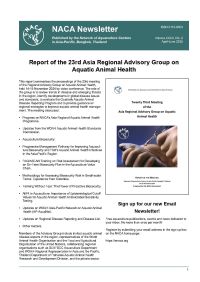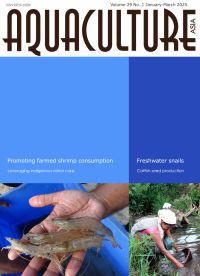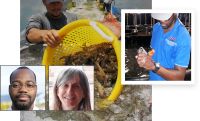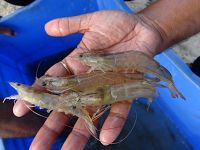In this issue:
- Report of the 23rd Asia regional Advisory Group on Aquatic Animal Health.
- Sign up for our new Email Newsletter!
- AQUAINNOVATE: An AquaHub Event.
- Workshop on sustainable brine shrimp Artemia cultivation, 17 February, Tashkent.
- Tuskfish CMS V2.1 released.
- TCRS Shrimp Summit to spotlight issues.
- Global Artemia Summit: 27 June, Entebbe, Uganda.
In this issue:
- Promoting farmed shrimp consumption in India’s domestic market: A step towards sustainability
- Leveraging indigenous minor carp for sustainable aquaculture in Northeast India
- Shaping the future of Indian aquaculture: A path to captive catfish seed success
- Sustainable freshwater snail farming: Advancing nutrition security and rural livelihoods in Northeast India
- Promotion and protection of small fish species through farming: An initiative in Tripura
- NACA Newsletter
PORTSMOUTH, NH: Shrimp experts from around the world will gather in Bali this June for the third annual TCRS Shrimp Summit—a one-of-a-kind event that explores the issues impacting the industry's health and future, from the pond to the market. The summit is unique not just because it represents the full value chain, including major buyers, but because it spotlights the topics, both technical and tactical, that are driving change.
This year's Summit, which takes place 22-25 June, 2025, introduces several new sessions that demonstrate the event's role as a singular forum for investigating the issues that matter.
One such issue is Shrimp Welfare, particularly the use of eyestalk ablation for rapid egg production. Dr. Simão Zacarias, one of the session speakers and a recipient of the 2020 Global Aquaculture Innovation Award, says that, "although eyestalk ablation can boost egg production, it is also associated with female broodstock stress, physiological imbalance, mortality, and compromised diseas resistance in offspring."
India's shrimp farming industry plays a crucial role in the national economy, with Penaeus vannamei dominating production and exports. Despite India being one of the world's largest shrimp producers, domestic shrimp consumption remains low. This article explores the economic significance of farmed shrimp, the challenges faced by shrimp farmers in West Bengal, and the potential for expanding the domestic market to enhance industry sustainability. Promoting farmed shrimp consumption within India is a viable strategy to stabilize the industry. Increasing consumer awareness of shrimp’s health benefits, developing efficient distribution networks, and leveraging marketing initiatives could enhance domestic demand. Government agencies, industry associations, and private enterprises must collaborate to establish shrimp as a mainstream protein source in Indian diets, thereby ensuring long-term sustainability for shrimp farmers.
With the implementation of the new aquatic animal disease reporting in the Asia Pacific region from January 2021 NACA is publishing reported aquatic animal diseases submitted by countries in the Asia-Pacific region. This report covers the second quarter of 2024 and the original and updated reports can be accessed from the QAAD page.



